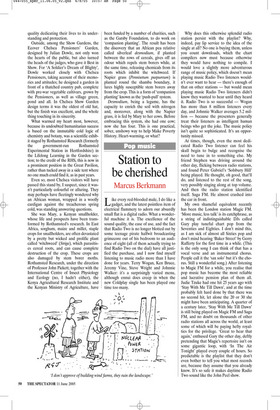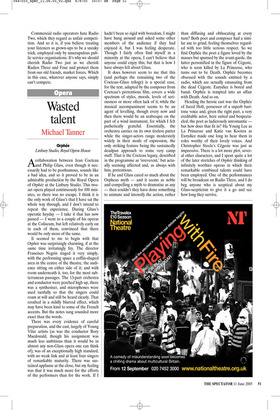Station to be cherished
Marcus Berkmann
Like every red-blooded male, I do like a gadget, and the latest pointless item of electrical flummery to adorn our absurdly small flat is a digital radio. What a wonderful machine it is. The excellence of the sound quality, the ease of use, and the fact that Radio Two is no longer blotted out by some teenage pirate halfwit broadcasting grimecore out of his bedroom to an audience of eight (all of them actually trying to find Radio Two on the dial) have all justified the purchase, and I now find myself listening to music radio more than I have done for years. Terry Wogan, Ken Bruce, Jeremy Vine, Steve Wright and Johnnie Walker: it’s a surprisingly varied menu, although ennui does creep in when the new Coldplay single has been played one time too many. Why does this otherwise splendid radio station persist with the playlist? Why, indeed, pay lip service to the idea of the single at all? No one is buying them, unless you count downloads, which the chart compilers now must because otherwise they would have nothing to compile. I would love a slightly more adventurous range of music policy, which doesn’t mean playing music Radio Two listeners wouldn’t ever want to hear — there’s enough of that on other stations — but would mean playing music Radio Two listeners didn’t know they wanted to hear until they heard it. Radio Two is so successful — Wogan has more than 8 million listeners every day, and Johnnie Walker averages 5.2 million — because the presenters generally treat their listeners as intelligent human beings who get the joke. The music policy isn’t quite so sophisticated. It’s an opportunity missed.
At times, though, even the most dedicated Radio Two listener can feel his skull begin to bulge and recognise the need to tune in to something else. My friend Stephen was driving around the other day, flicking between radio stations, and found Peter Gabriel’s ‘Solsbury Hill’ being played. He thought, oh good, that’ll do, and listened to the rest of the song, very possibly singing along at top volume. And then the radio station identified itself. Saga FM. He almost crashed into the car in front.
My own shameful equivalent recently has been the London station Magic FM. ‘More music, less talk’ is its catchphrase, as a string of indistinguishable DJs called Gary play tuneful chart pop from the Seventies and Eighties. I don’t mind this, as I am sick of almost all Sixties pop and don’t mind hearing ‘Baker Street’ by Gerry Rafferty for the first time in a while. (This is the only song I can think of that has a vocal verse and an instrumental chorus. People call it the ‘sax solo’ but it’s the chorus. Still a wonderful song.) After listening to Magic FM for a while, you realise that pop music has become the most reliable and lucrative pension plan of them all. Judie Tzuke had one hit 25 years ago with ‘Stay With Me Till Dawn’, and at the time probably felt hard done by that there was no second hit, let alone the 20 or 30 she might have been anticipating. A quarter of a century later, ‘Stay With Me Till Dawn’ is still being played on Magic FM and Saga FM, and no doubt on thousands of other radio stations all across the world, at least some of which will be paying hefty royalties for the privilege. ‘Great to hear that again,’ enthused Gary the other day, deftly pretending that Magic’s repertoire isn’t on some gigantic loop, with ‘In The Air Tonight’ played every couple of hours. So predictable is the playlist that they don’t even bother to tell you what most records are, because they assume that you already know. It’s so safe it makes daytime Radio Two sound like the John Peel show. Commercial radio operators hate Radio Two, which they regard as unfair competition. And so it is, if you believe treating your listeners as grown-ups to be a sneaky trick, employed only by unscrupulous public service organisations. It’s why we should cherish Radio Two just as we cherish Radios Three and Four and protect them from our old friends, market forces. Which in this case, whatever anyone says, simply can’t compete.



















































 Previous page
Previous page